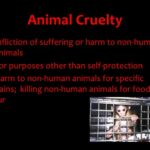Animal cruelty is a solemn topic that often invokes strong emotions and ethical deliberation. Though societal views on animal welfare have evolved significantly over the years, ancient texts, including the Bible, offer a foundation for understanding humanity’s moral responsibilities toward animals. Analyzing biblical references provides an opportunity to examine the intrinsic value attributed to animals and the ethical impositions placed upon humankind concerning their treatment.
The Bible, which encompasses a rich tapestry of historical narratives, legal codes, and poetic literature, lends insights into the moral framework regarding animals. Animal welfare concepts do not exist as monolithic doctrines but rather as nuanced paradigms scattered throughout biblical texts. Hence, a critical examination reveals the multifaceted nature of biblical attitudes towards animals.
In the creation narrative, notably in Genesis, we observe the initial portrayal of animals. Man is instructed to have dominion over the creatures of the earth. However, this dominion is often misconstrued. The Hebrew word “radah,” translated as “to rule,” carries connotations of stewardship rather than exploitation. This subtle distinction prompts a shift in perspective: humanity’s dominion is not a blank check for cruelty but a call to responsible stewardship.
Animals are frequently depicted in the Bible not merely as creatures for human benefit but as beings worthy of compassion. For instance, Proverbs 12:10 states, “A righteous man regardeth the life of his beast: but the tender mercies of the wicked are cruel.” This verse elucidates the moral imperative for compassion toward animals, suggesting that cruelty is an inherent characteristic of the morally deficient. Herein lies a profound challenge to the reader: the ethical treatment of animals becomes an extension of one’s moral character.
Furthermore, the biblical statutes provide a glimpse into the legal considerations surrounding animal welfare. In Exodus 23:5, it commands, “If thou see the ass of him that hateth thee lying under his burden, and wouldest forbear to help him, thou shalt surely help with him.” This injunction reflects a deeper ethical obligation that transcends personal grievances, asserting that one must assist even one’s adversary’s suffering animal. The underlying principle emphasizes empathy and social responsibility. Therefore, cruelty is not merely an act against animals but a violation of ethical norms.
Moreover, the concept of rest is not exclusive to humanity in the biblical context. In the Sabbath commandment, found in Exodus 20:10, it encompasses livestock, stating, “But the seventh day is the sabbath of the Lord thy God: in it thou shalt not do any work, thou, nor thy son, nor thy daughter, thy manservant, nor thy maidservant, nor thy cattle.” The inclusion of animals in commandments relating to rest highlights their intrinsic value and the belief that they, too, require care and rejuvenation. This may provoke questions about contemporary industrial practices that neglect animal welfare in pursuit of profit—a stark contrast to biblical teachings.
Another compelling aspect is found in the depiction of God’s covenant with Noah following the flood. The promise, “I will never again curse the ground because of man, for the intention of man’s heart is evil from his youth. Neither will I ever again strike down every living creature as I have done” (Genesis 8:21) illustrates a divine empathy towards all living beings. This covenant indicates God’s commitment to all creatures and by extension, challenges humanity to align its actions towards animals with divine compassion.
The New Testament echoes similar sentiments, emphasizing mercy and kindness. When Jesus, in Matthew 10:29, states that “not one sparrow will fall to the ground apart from your Father,” it reinforces the belief that every creature holds significance in the divine economy. This perspective invites inquiry into how modern society may overlook or dismiss the interconnectedness of life. By recognizing the divine concern for animals, individuals can cultivate a sense of responsibility that transcends mere obligation.
In a contemporary setting inundated with ethical dilemmas regarding animal welfare—ranging from factory farming to the use of animals in entertainment—the biblical exhortations resonate more strongly than ever. They compel individuals to adopt a more conscientious approach toward animal rights and welfare. It prompts a reevaluation of personal practices and societal norms, encouraging individuals to champion legislation that protects vulnerable species and advocates for humane treatment.
Additionally, the contemporary movement toward veganism and cruelty-free practices finds philosophical roots in these ancient texts. As consumers become increasingly aware of the implications of their choices, biblical insights can serve as guiding principles for living harmoniously with all creation. The tenets of love, stewardship, and compassion resonate deeply within these discussions, urging humanity to redefine its relationship with animals.
As society reflects on the intersection of faith and ethics, an enlightening exploration of biblical teachings reveals a rich legacy of advocacy for animal welfare. By embracing these ancient truths, individuals are prompted to reconsider their actions and their broader implications on the planet and its inhabitants. Ultimately, the discourse surrounding animal cruelty and the teachings of the Bible offers an opportunity for transformative dialogue—it may pivot humanity toward a more compassionate future, inspiring change that restores dignity to every creature entrusted to human care.







